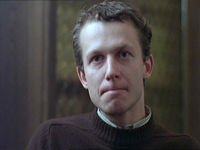tytuł oryginalny: Przypadek
reżyseria: Krzysztof Kieślowski
występują: Bogusław Linda, Tadeusz Łomnicki, Zbigniew Zapasiewicz
kraj i rok produkcji: Polska 1981
czas trwania: 112'
data premiery: 1987-01-09
original language: Polish with English subtitles

Zrealizowany w 1981 roku "Przypadek" trafił na polskie ekrany dopiero po sześciu latach, w zupełnie innej atmosferze. Jak się wtedy okazało, film Kieślowskiego nie epatował tonem oskarżenia, przeciwnie - można w nim było spostrzec dzieło poświadczające rezygnację z politycznej doraźności. Film pokazuje trzy różne losy jednego człowieka, Witka Długosza (Bogusław Linda), trzy potencjalne życiorysy jednej osoby, zależne wyłączne od przypadku. W pierwszej sekwencji Witek usiłuje zdążyć na pociąg do Warszawy i od tego zależą jego dalsze losy. Jeśli zdąży, spotka w pociągu starego działacza komunistycznego, który wciągnie go w orbitę władzy. Jeśli potrąci na peronie sokistę, to nie tylko nie zdąży, lecz zostanie jeszcze ukarany, a przez to dołączy do opozycji politycznej. W trzecim wariancie spotyka na peronie znajomą dziewczynę, co skończy się ślubem i wyborem apolitycznej kariery naukowca. Wszystkie warianty mają finał na lotnisku Okęcie, skąd Witek ma odlecieć za granicę.
Witek Długosz (B. Linda), a medical student, experiences three different variants of his fate by chance. Maybe it is not a coincidence, but a kind of inheritance after his twin brother who died in labor. Alternatively, it could be a symbolic strength of his date and place of birth - June 28, 1956, Poznań - that dooms him to a strong influence of modern history. Witek’s fate (being a member of the party or the opposition) depends on whether he catches a train at the Łódź Fabryczna station. On the train, Witek meets an old communist (T. Łomnicki), who, despite his experiences of Stalinism, persuades the young man to join the Polish United Workers' Party. In addition to that, the leaders of the party believe that Witek is a really prospective candidate. Missing the train means falling into the hands of a railroad guard. The young man is sentenced to community service. While working, he meets young oppositionists. Witek joins the "Flying University" group, prints underground press, supports the workers. He may also refuse to participate in the course of history - as a talented young doctor he enjoys the dean's trust and has the opportunity to start an academic career. The third variant - a neutral attitude towards the course of events in Poland at the beginning of the 1980s, turns out to be impossible.
Krzysztof Kieślowski, the director of the film, did not emphasize the political divisions in Poland in that period of time. He proved that people could behave decently, regardless of their position in the political dispute. The short and tragic third variant, describing a neutral attitude towards the Polish People’s Republic, condemns the protagonist to failure, even annihilation. The film, stopped by censorship, struggled to make its way to the public.